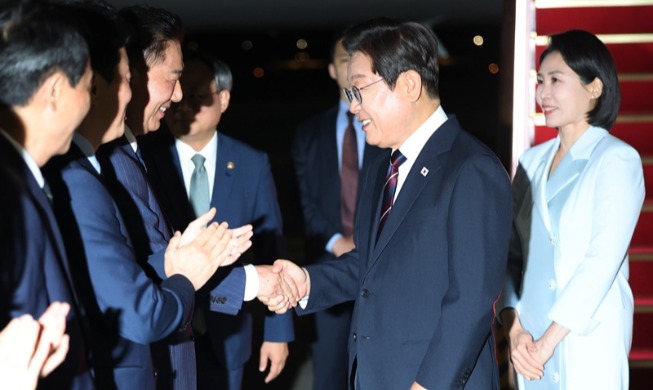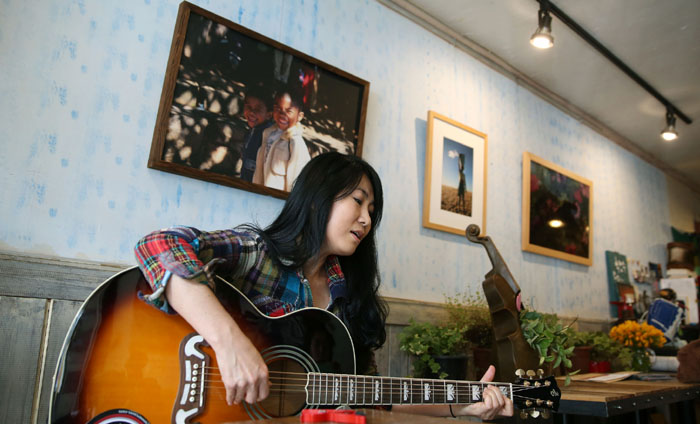
Singer Park Kang-soo accompanies herself as she sings one of her own compositions, ‘Spring is Coming.’
She is not the kind of singer who has a crowd of adoring fans swarming to her concerts. She is certainly not a performer who can dance or give off a flamboyant performance under a bright spotlight, as most idol groups do. In contract to this, having first come to the stage in her early 20s, her singing career has now begun to approach perfection, as she recently entered her forties.
Numerous nicknames have been given to singer Park Kang-soo. She’s often dubbed the “Joan Baez of Korea,” the "next Yang Hee-eun” or the “female Kim Kwang-seok,” to name just a few. Yang Hee-eun is a female singer who represented the younger generation and its music in the 1970s. The late Kim Kwang-seok was a true sensation, winning the hearts of his fans across more than 2,000 concerts between the 1980s and the 1990s.
Recently, on March 5, Park Kang-soo released her seventh full-length album, “Butterflies.” As one can sense with the new songs, she still retains her signature effervescent and outspoken spirit.
The title track of the new album is “Butterflies.” The lyrics go:
It’s spring when flowers are flying around.
It’s spring when the fragrance is coming along.
Butterflies are flying around and over the blue wall…
She wrote the lyrics herself, and Park likens the freedom of flying to butterflies, a freedom that can now be enjoyed in the spring as the chilly winter has departed.
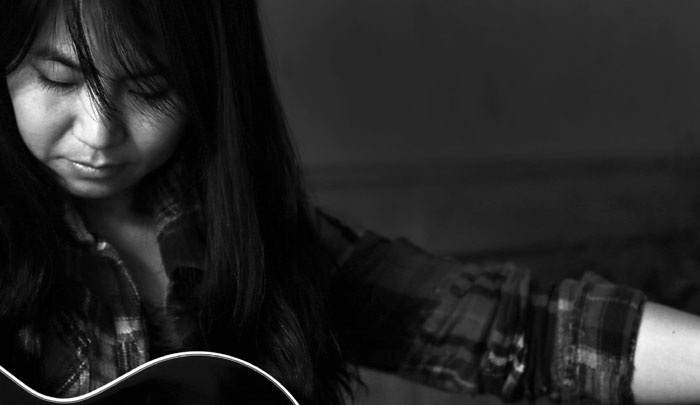
Park Kang-soo sticks with her passion for singing ever since she felt a bit of culture shock when she happened to hear some Western music on a record player when she was in her 20s working in a pub in Suwon, Gyeonggi-do (Gyeonggi Province).
It has been 15 years since she made her official debut as a singer, though it has been more than 20 years since she started singing. Over such a career, she was never without a contract with an agent or a record company. She started with just a single guitar and nothing else. She’s travelled nationwide to sing, and has also travelled far from home, to Haiti, Ethiopia and Madagascar. She went everywhere she was needed. The singer also entertains on TV and on the radio.
Still, her main stage has always been at small theaters, where she sings live for her loyal fans who come from across the country. It seems that she’s been on an endless journey.
Park is one of the few singers who has kept the tradition of folk music alive. When folk first arrived on Korean shores, the desire for freedom and the spirit of resistance embedded in the music was exactly in tune with what the youth longed for at that time.
Such songs touched the hearts of many young people, with lyrics and melodies that embraced a fresh, pure and defiant spirit. Those who grew up listening to folk music during the period are now called the "generation of the '70s and '80s,” and constitute much of the post-1950s baby-boom generation. Today, they range in age from their mid-40s to their late 50s.
Folk songs beloved by that generation are quite different from the saccharine pop songs that have a fan base of teenage boys and girls. There’s no teenage enthusiasm in folk music, but an ambient, steady round of applause, and cheers ring out when it is sung. The music has positioned itself as one of the mainstays that has created the broad and deep modern Korean music industry.
Korea.net recently sat down with the singer to hear more about her journey to find her voice and talent.
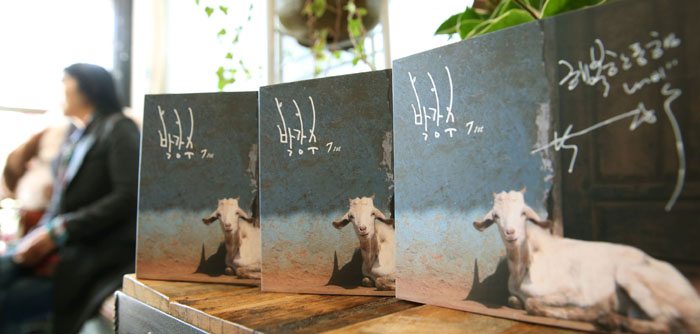
Singer Park Kang-soo unveils her seventh full-length album, ‘Butterflies,’ on March 5.
- Your lyrics tend to reflect love and nature, showing a world of art. What is it that makes you focus mainly on these subjects?
I can find the real me when I am in a boorish places, like along an unpaved road, of course, as well as when I am singing on stage. I can truly be myself when I am in an unfamiliar place, although there is a sense of difference. In that sense, traveling to other countries, especially to far, remote countries on the other side of the world, gave me the chance to encounter my inner self. Seeing in person the places I encountered only in books is like entering a whole new world. This adventure gave me a lot of inspiration.
- We heard that you grew up in Namwon in Jeollabuk-do (North Jeolla Province) and in Damyang, Jeollanam-do (South Jeolla Province), regions where you had almost no access to any kind of music, not to mention access to Western folk music.
Yes. I didn’t even have the chance to stumble on any type of pop or rock songs until I moved up closer to the capital. In hindsight, I was fated to become a singer. I mean, I believe such destiny was already decided in the first place. Nobody got me to "do" singing, but now I sing and even write songs. I was meant to do this.
My mother is also a factor behind my fate. She was quite a good singer, too. I remember she sang hymns all the time, listening to Christian radio shows.
- Your journey to become a singer seems like a bumpy one, as you had to go through numerous odd jobs, such as working part-time at a pub and singing at a café in Misari, Gyeonggi-do (Gyeonggi Province). Please tell us more about all that.
I started singing at the age of 20 when I moved to Suwon in Gyeonggi-do. I landed a part-time job at a pub, called “Nageurang.” While I was serving customers, the music always came from LP vinyl records. The pub occasionally hosted live concerts and also had a DJ in place. Listening to such a variety of songs at work opened a whole new world for me. When I first heard ABBA’s “Chiquitita,” it came as a culture shock. It felt like walking into an unknown world that I never thought existed. Working there, I was exposed to a variety of musical genres.
If I say that I found my talent for singing in my 20s, it’s taken 27 more years to recognize another talent: writing songs. Also, I got to learn how to play the guitar as I went to church. I found playing the instrument fun and quickly mastered the skills, all by myself. I did all I could to master it, as I thought developing my technique would definitely support the beauty of my voice.
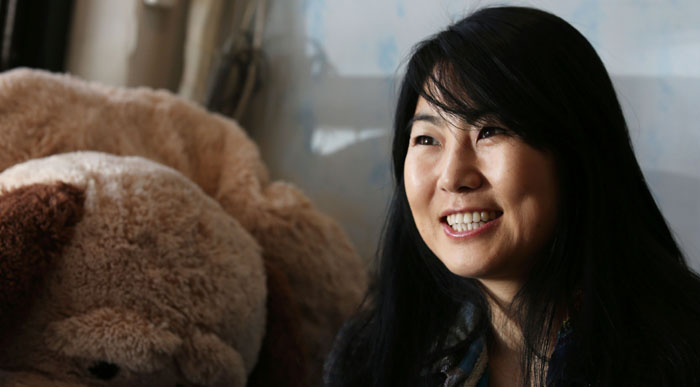
I’ve gone through a lot of ups and downs before arriving at where I am today. I wanted to give up many times when I sang at a café. At that time, it was like pushing myself to the limits. Sometimes, I was swamped with worries when I realized the huge gap between my ideals and reality.
I was then determined to pull myself together and give it another shot. I went to Seoul with only KRW 1 million in hand. I attended an audition in Yeongdeung-po and did well.
I got to know music critic Goo Ja-hyeong. My connection with him opened a new window for my career. He helped me appear on the long-running radio show “Into Music" (unofficial title). Afterward, I was offered the chance to appear on the show as a regular. I did that for five years. I was really lucky. Thanks to the experience I earned singing at the café, the job was easy and fun.
Given all that I’ve gone through before I grew into what I am now, I couldn’t have moved to Seoul with just a guitar if I had not had the strong passion for my music. I am so proud of my younger self. Without such passion and determination, I wouldn’t have come this far.
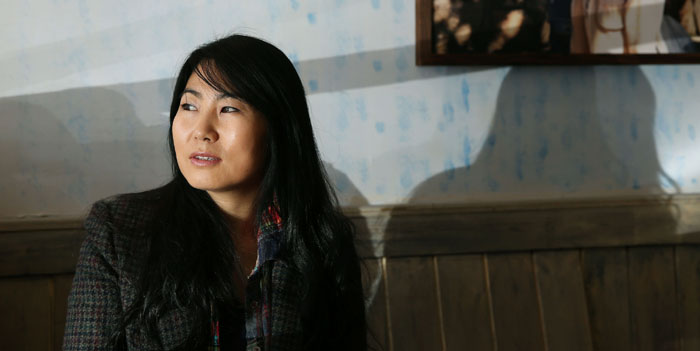
- You have been given many great nicknames, such as a singing poet, the "Korean Joan Baez," the "next Yang Hee-eun" and even the "female Kim Kwang-seok." How do you feel about those names?
Nothing is as good as just being called “Park Kang-soo.” However, I'm really grateful for having those great nicknames. Being called the “Joan Baez of Korea” is an honor for me.
Looking back on my history, my life as a singer has been something of a success. I’ve come to where I stand now all by myself without help from anyone. I would say that now is my prime as a singer. One of my dreams was to release my own albums, and I did it. Another was to open a small theater where I could sing as I pleased, and I did that, too.
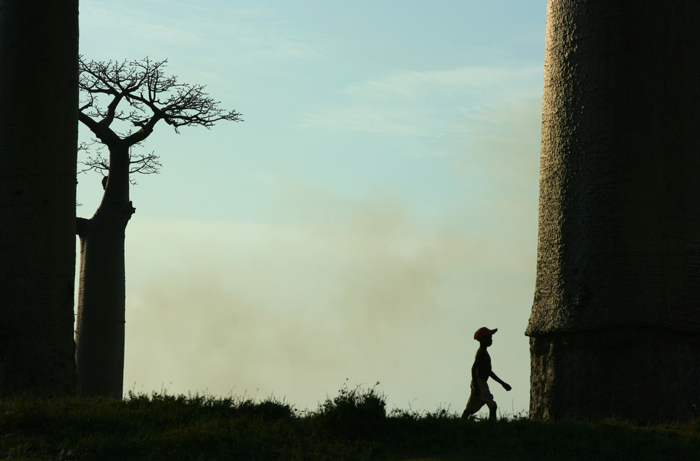
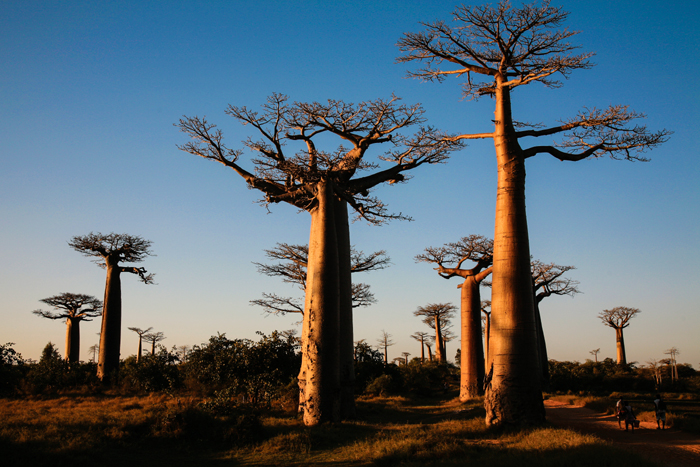
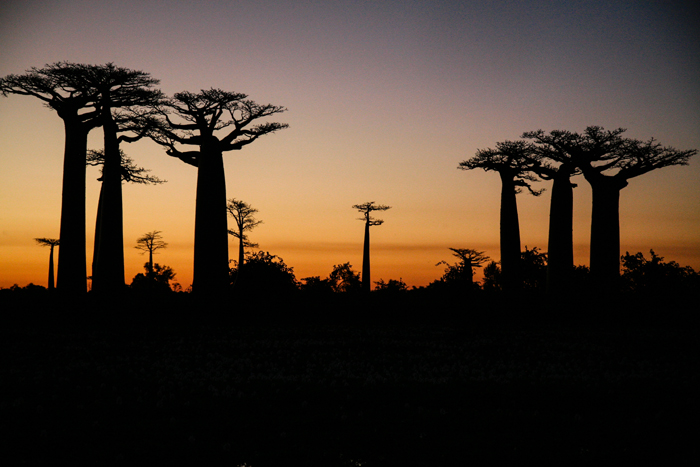
Singer Park Kang-soo captures the scenic landscape of Madagascar while travelling across the island country.
- It seems that you and travelling are bound to each other. We heard that travelling to other parts of the world has given you a sense of freedom.
Living in Seoul and singing for many years, I suddenly felt sick and tired of being stuck in a rut. I was always afraid of losing some opportunity and was always trapped in the rat race. I would cling to everything around me. Suddenly, I realized that I was trapped in too small a world. Once I had the chance to travel, but first I was worried about having my radio show suspended. I thought I might lose some hard-earned job if I went abroad for any length of time. I was reluctant to leave.
However, I chose to pack things up and leave. I soon realized that you give up on something and take on a new adventure, you will earn more than you lose.
Travelling around the world earned me a lot of things. I gained confidence and learned how to enjoy my life to the fullest. I got to know how to take a better path, a path that I really wanted to have an adventure along.
On my way back home after travelling around Madagascar, I suddenly thought that it would be great to open a concert hall of my own. I put the idea into action right away. I opened a small concert hall in Sinchon, using the key money from my apartment.
I had much more to gain than lose through travel. After travelling around a bit, I had more stories to tell and my music itself took on a new color, too.
- You travelled to both Haiti and Madagascar. Those countries are quite unfamiliar to many people. What made you choose those remote, poverty-stricken countries, among all the countries available?
One of my acquaintances recommended I sing at a hospital in Haiti, as I was able to perform with just a single guitar and didn't need any stage settings or fancy equipment. It was great that I could give patients there some time to laugh and have a bit of fun, and a chance to look at me: an Asian of a different color and voice, singing for them. I was happy to help them forget pain for a while. I learned a lot from that experience.
I’ve been to Madagascar twice. The second chance to travel the country came when the “World Theme Travel” program, aired on EBS, called to suggest that I appear in its four-part travel documentary that was going to focus on Madagascar.
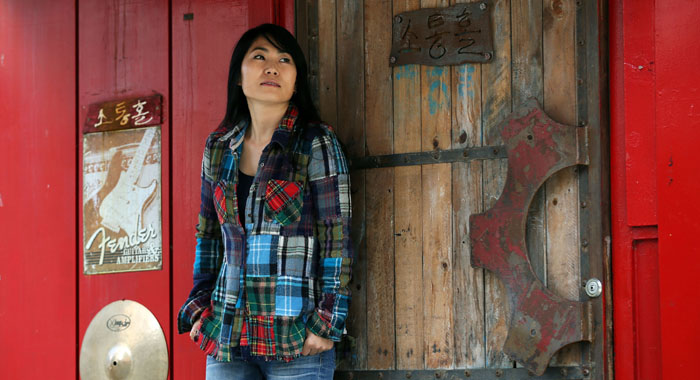
Singer Park Kang-soo poses in front of her Sotonghall theater in Shinchon, in Seoul. The singer has held concerts there for the past six years.
- You’ve constantly kept yourself close to your loyal fans. What do your fans mean to you?
They are like a motor. They drive me to keep singing and to keep practicing. Had it not been for the fans, I am not sure I would still be singing now.
- It might sound silly, but we wonder which singers or songs are your favorite.
I like Emmylou Harris and Joan Baez. To choose a Korean singer, I like Yeojin.
Emmylou Harris and Joan Baez, who both still sing, grey-haired, playing the acoustic guitar, are my everlasting idols,
- Do you have any other goals to achieve as a singer? What does music mean to you?
Singing and composing is my own way of communicating with the world. Music leads me down a path where I can talk to the world and its people. I hope to become a singer who has many people listening to my songs and my stories, not a singer who talks to herself. That means that I have to create hit songs that are much listened to and that are constantly given feedback from the audience. That’s my goal: to create more hit songs. Only then can I feel that I am doing well in communicating with my fans.
I’d like to take this opportunity to express my sincere gratitude to all those who have listened to and loved my stories so far. I am really grateful for your support. I hope that more opportunities will come, to keep me going even further.
For me, singing is like keeping a diary. I’ve done nothing but sing since my 20s. I’ve spent those 20 plus years, singing, writing songs and performing. I’ve recorded my life over the past 20 years through music.
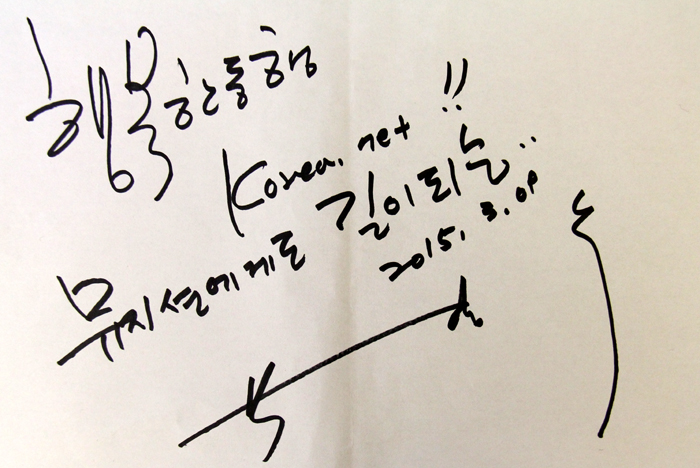
Singer Park Kang-soo signs an autograph for Korea.net readers. It says, ‘Happy journey with Korea.net! Hopefully there will come more opportunities for musicians.’
Park Kang-soo - Spring is Coming
Photos: Jeon Han
Korea.net Staff Writers
Whan23@korea.kr
* Singer Park Kang-soo is scheduled to hold a concert at 7:30 p.m. on March 18. The concert takes place at the Sotonghall theater in Sinchon, Seoul. For more information, please contact 02) 718-3487 or 1544-1555.
Most popular
- Military discharge sets stage for reunion of all 7 BTS members
- 'We are back!' BTS Festa heralds hyped return of K-pop phenom
- K-pop streaming on Spotify skyrockets 470-fold in 10 years
- Presidents Lee, Trump discuss tariff deal in first phone talks
- President Lee leaves for G7 Summit in Canada on first int'l trip
